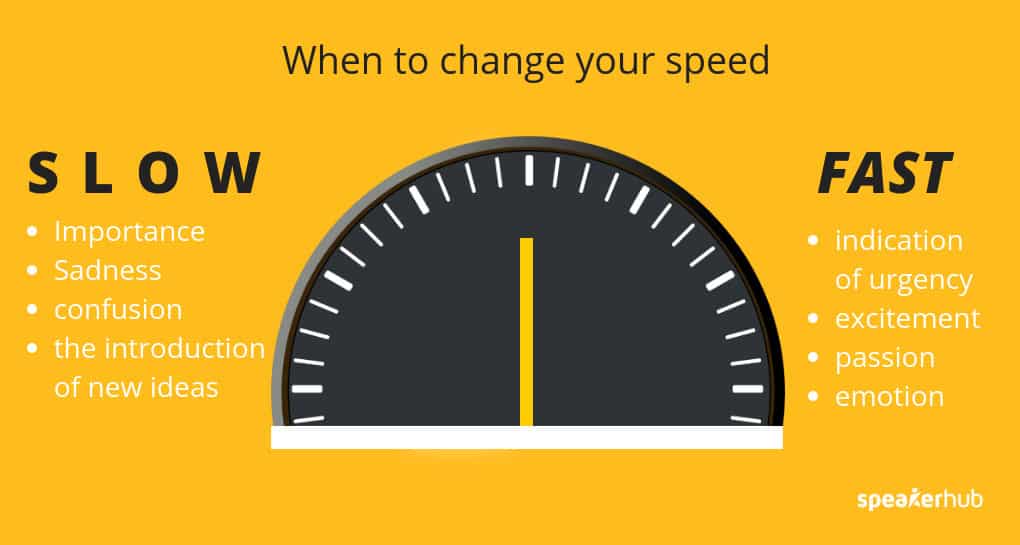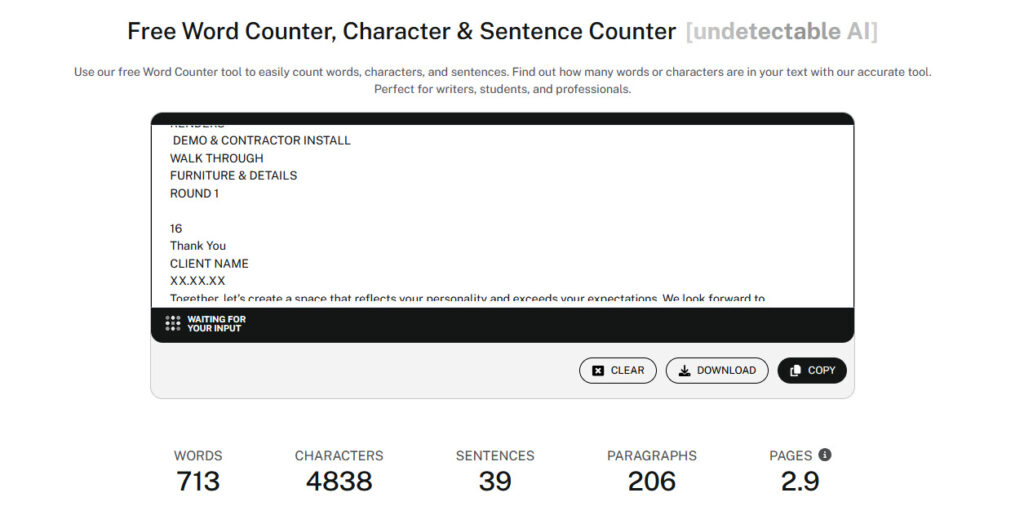Getting up on stage and stepping on the podium itself is frightening. Doing the speech and talking to dozens or hundreds of people is absolutely nerve-wracking.
And it’s not just you that feels this way. 75% of people worldwide have a fear of public speaking.
And what do you think all these 200 million people rely on to combat this fear? Preparation.
This includes the content, the story, and even the word count.
You can’t just start writing your speech without a target length, right? So you need to be ready and informed on how long your speech should be.
Understanding speech length is important for any presenter, whether you’re giving a wedding speech or a TED Talk.
Maybe you need to figure out how many words are in an 8-minute speech or how many words are in a 6-minute speech.
Either way, it’s the difference between a polished presentation and getting cut off mid-sentence.
In this guide, we’ll unpack everything you need to know about speech length and timing and how to calculate exactly how many words fit in your allotted speaking time.
Let’s break down the science and art of speech pacing to help you deliver with confidence.
What Is the Average Speech Speed?
Have you ever noticed how some speakers seem to pack a novel’s worth of information into just a few minutes, while others stretch a few ideas across an hour? It’s all about speaking pace.
Most experienced public speakers deliver approximately 120-150 words per minute (WPM).
This pace lets audiences absorb your message comfortably without getting bored or overwhelmed.


Never Worry About AI Detecting Your Texts Again. Undetectable AI Can Help You:
- Make your AI assisted writing appear human-like.
- Bypass all major AI detection tools with just one click.
- Use AI safely and confidently in school and work.
Not too fast, not too slow—just right.
Professional radio announcers often speak at 150-160 WPM, while auctioneers might hit an impressive 250-400 WPM.
But before you try to match these specialized rates, remember they’re trained professionals speaking to very specific audiences.
Your speaking pace should match your purpose. An emotional story deserves a slower, more measured delivery. Technical information might benefit from a moderate pace with strategic pauses for absorption.
Understanding your baseline WPM is the first step toward controlling your delivery for maximum impact.
How Words Per Minute (WPM) Affects Speech Length
Your speaking speed directly determines how much content you can deliver in a fixed time slot. It’s simple math, but the implications are profound.
At the standard 130 WPM, an 8-minute speech contains roughly 1,040 words. Bump that up to 150 WPM, and suddenly, you can deliver 1,200 words in the same timeframe.
That’s potentially dozens more ideas, examples, or points of evidence.
But there’s a catch. Faster isn’t always better. Research shows comprehension drops significantly when speakers exceed 160 WPM.
Audience members start missing key points, and retention plummets. Every 10 WPM increase beyond this threshold can reduce comprehension by up to 10%.
Speed also affects perceived expertise.
A study found speakers with moderate paces (around 140 WPM) were rated as more knowledgeable and credible than very slow or very fast speakers.
Consider these typical speech lengths at 130 WPM:
- 5-minute speech: ~650 words
- 8-minute speech: ~1,040 words
- 10-minute speech: ~1,300 words
- 15-minute speech: ~1,950 words
The takeaway? Your word count isn’t just about filling time—it’s about optimizing comprehension, retention, and credibility.

Why Speaking Speed Varies by Speaker & Topic
No two people speak at the same pace. It’s like handwriting, where your delivery style is yours alone.
Your rhythm, your cadence, your speed. It all shifts based on where you’re from, what you’re talking about, and how well you know the material.
If you’re from the South, you probably speak slower than someone from, say, Seattle.
If you’re explaining blockchain tech to non-techies, you’re likely clocking in way slower than when you’re riffing on your favorite topic with friends.
What you’re talking about really matters.
Technical topics slow people down. You’re not going to rattle off high-level jargon at 170 words per minute unless you’re trying to lose the room.
On the flip side, passionate, high-energy speeches tend to speed up, especially when the momentum kicks in.
Familiarity changes the game too. When you’re deep in your zone, talking about something you know inside and out will naturally make you speed up.
But with new or scripted material, even confident speakers pump the brakes to avoid tripping over words.
Some rough benchmarks to work with:
- Academic lectures: ~100–120 WPM
- Business presentations: ~120–140 WPM
- Motivational speaking: ~140–160 WPM
- Casual convo: ~150–180 WPM

Image Source: Speakerhub
But don’t get too hung up on these numbers.
The real pros don’t aim for a fixed pace and adjust in real time. They slow down to land a punchy idea. They speed up when storytelling hits its stride.
That’s what keeps people locked in.
The Role of Pauses & Emphasis in Speech Timing
Here’s something most folks forget: silence speaks too.
Pauses aren’t just breaks to breathe—they’re the secret sauce. The well-timed pause makes a good speech unforgettable.
Quick rundown:
- Micro-pauses (0.5–1 sec) – right after you say something important
- Standard pauses (1–2 sec) – between big ideas or section shifts
- Dramatic pauses (2–4 sec) – when you’re about to drop something heavy
These pauses add up.
A 10-minute talk usually includes close to a full minute of intentional silence. That’s not wasted time.
That’s where your words sink in.
And then there’s emphasis. We stretch words we care about.
That’s why the same speech delivered with more passion and intention can end up taking a full minute longer than a monotone version.
Great example? MLK’s “I Have a Dream.” He slowed down for the powerful stuff, almost down to 80–90 WPM, then picked up the pace during transitions.
That rhythm, that contrast, is what made every word land like a hammer.
So, when you’re calculating how long your speech will take, don’t just count the words.
Count the moments too. A 1,000-word speech with real weight and timing might last 9 minutes—not 7.5.
Because it’s not just what you say. It’s how you hold the room in the in-between.
Average Words Per Minute in a Speech
Let’s cut to the chase with an example: How many words should be in your 8-minute speech?
The answer depends on your natural speaking pace, but we can provide reliable ranges.
For most speakers, an 8-minute speech contains:
- Slow pace (100 WPM): ~800 words
- Average pace (130 WPM): ~1,040 words
- Moderately fast pace (150 WPM): ~1,200 words
- Fast pace (170 WPM): ~1,360 words
Unlike writing an essay, the sweet spot for most presenters falls between 1,000-1,100 words for an 8-minute speech.
This allows for a natural delivery with room for pauses, emphasis, and spontaneous moments that make live speeches engaging.
Professional contexts often expect different pacing:
- Academic presentation: 880-960 words (8 minutes)
- Corporate presentation: 960-1,120 words (8 minutes)
- Wedding toast: 520-640 words (4-5 minutes)
- Graduation speech: 1,300-1,500 words (10-12 minutes)
Remember that these numbers represent written words. Spontaneous additions, audience reactions, and technical difficulties can all affect your actual speaking time.
The prudent approach? Prepare slightly less content than you think you need, giving yourself a 10% buffer for the unexpected.
How to Calculate Your Speech Speed
Wondering exactly how fast you speak? Here’s a simple DIY method: Record yourself delivering a 2-minute segment of your speech naturally.
Count the words, then multiply by 30 to get your hourly rate. Divide that figure by 60 for your words per minute.
For a more precise measurement, Undetectable AI’s Word Counter tool provides an easier solution.
This automated calculator not only counts your words but analyzes your document structure, helping you optimize for spoken delivery.

Here’s how to use it:
- Copy your speech text
- Navigate to Undetectable.ai’s Word Counter
- Paste your text in the analysis box
- Click “Calculate”
- Review your word count and estimated speaking time
The tool instantly shows how many minutes your speech will take at different speaking rates, allowing you to make informed edits.
It even highlights potentially problematic sections that might trip up your delivery or exceed time limits.
Beyond basic counting, the Word Counter analyzes sentence length variation—a key factor in engaging presentations.
Too many sentences of similar length create a monotonous rhythm that lulls audiences to sleep.
The tool flags these patterns, helping you create more dynamic, engaging speeches.
How to Control Your Speaking Speed for Impact
Mastering your pace is a game-changer for public speaking. Here’s how to control your speaking speed with purpose.
Start by establishing your baseline. Record yourself delivering part of your speech naturally, then calculate your WPM. This becomes your foundation for strategic adjustments.
Want to slow down? Try these proven techniques:
- Mark natural breathing points in your text
- Highlight 2-3 words per paragraph to emphasize
- Practice with a metronome set to 120 beats per minute
- Record yourself and listen critically
Need to speed up without sounding rushed?
- Eliminate unnecessary phrases (“I think,” “you know,” “actually”)
- Practice with a slightly faster speaker as your model
- Record sections and gradually increase tempo
- Focus on crisp articulation rather than faster mouth movements
The most impactful speakers vary their pace intentionally. Try using this pattern in your next presentation:
- Begin at your natural pace (establish comfort)
- Slow down 10-15% for complex information
- Speed up 10-15% for stories or examples
- Slow dramatically for key takeaways
- Return to natural pace for conclusion
Practice makes perfect. Rehearse with a timer until your pacing becomes second nature. Record yourself to identify patterns and problem areas.
Remember, controlling your pace isn’t just about fitting within time constraints. You should also lead your audience through emotional and intellectual terrain with intention.
How Our Word Counter Helps You Perfect Your Speech
Creating a well-timed speech used to involve guesswork, clock-watching, and rounds of painful edits.
But with our Word Counter, that stress gets cut out of the process. It gives you instant control over your speech length down to the second.
Whether you’re wondering how many words in a paragraph are too much for spoken delivery, the tool handles the heavy lifting with precision.
This isn’t just a basic word counter. It’s a multi-function tool built for actual speakers. You get:
- Custom words-per-minute (WPM) pacing that reflects your natural delivery style
- Sentence and paragraph length breakdowns that help you manage pacing and engagement
Undetectable AI’s Word Counter helps you skip the stress and focus on writing your message.
Be sure to check out our AI Detector and Humanizer in the widget below as well!
FAQs About Speech Speed
How many words per minute is normal?
Most English speakers talk at 120–150 words per minute. TED Talks average 163 WPM—faster, but still clear. Your ideal pace depends on accent, topic, and style.
The key is to stay consistent unless you’re changing pace for effect.
How many words in an 8-minute speech?
Around 960–1,200 words. Aim for 1,000 as a safe middle ground, factoring in pauses, transitions, and emphasis.
Tight on time? Stick closer to 960 to stay on track.
How can I improve speaking speed?
– To speed up: practice tongue twisters, read aloud, and track your tempo.
– To slow down: mark pauses in your script, count silently after key points, and finish each word clearly.
Either way, consistent feedback and practice can shift your pace by 15–20%.
The Final Word (Count)
The perfect speech balances content with timing.
For an 8-minute presentation, aim for approximately 1,040 words at a standard pace, but remember that your unique speaking style and content complexity will influence the final word count.
Speaking rate isn’t just a technical consideration but a powerful part of communication.
Mastering your pace allows you to guide the audience’s attention, emphasize key points, and deliver with confidence and authority.
Tools like Undetectable AI’s Word Counter removes the guesswork, allowing you to focus on connecting with your audience and delivering your message with impact.
The next time you approach the podium, you’ll do so with precision and confidence, knowing exactly how your words will fill the time you’ve been given.
That knowledge transforms nervous anticipation into the calm assurance of a speaker who has mastered both content and delivery.
Ready to perfect your next speech? Try our Word Counter today and discover the difference that precision timing makes in the art of public speaking.
